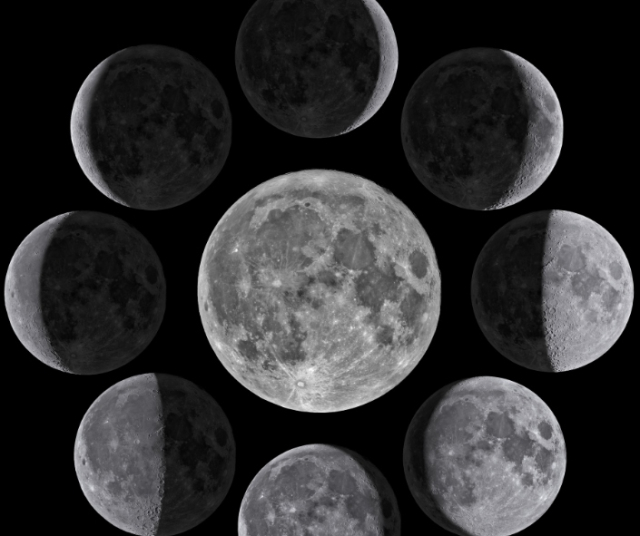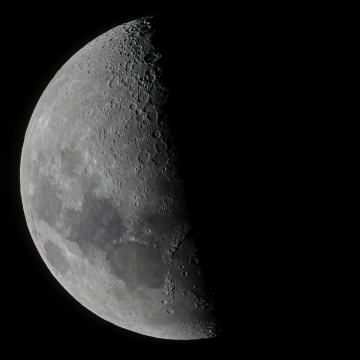The Moon, that mysterious and constant celestial companion of the Earth, has fascinated humanity since time immemorial. In addition to its beauty in the night sky, the Moon has also influenced our lives in ways that often go unnoticed. One of the areas where the Moon has a significant impact is the lunar phases. In this comprehensive guide, we will explore the power of the lunar phases, their influence on various aspects of our lives, and how to harness this knowledge to improve our health, well-being, and productivity.
The Moon Phases and their Cycle
Before we dive into the details of how the moon phases affect our lives, it's important to understand the basic lunar cycle. The Moon goes through a complete cycle of phases approximately every 29.5 days. This cycle consists of eight main phases:
- New Moon: In this phase, the Moon is directly between the Earth and the Sun. It is not visible from the Earth.
- Crescent Crescent: The Moon begins to be visible as a thin crescent sickle.
- First Quarter: Half of the Moon is visible at this stage.
- Waxing Gibbous: More than half of the Moon is visible, but it is not yet fully illuminated.
- Full Moon: The Moon is completely illuminated and is visible in its full round shape.
- Waning Gibbous: The Moon begins to decrease its illumination.
- Last Quarter: Half of the Moon is visible at this stage.
- Waning Waning: The Moon is almost invisible, only a thin waning sickle is visible.
The Influence of the Moon Phases on Nature
The lunar phases have a notable impact on the nature around us. Phenomena such as tides are directly related to the gravitational pull of the Moon on the Earth. During the New Moon and Full Moon, the tides are more extreme due to the alignment of the Earth, Moon and Sun.
In addition to the tides, the lunar phases also influence the activity of animals and plants. For example, anglers often follow the lunar cycle to determine the best times to fish, as certain species of fish are more active during different phases of the Moon.
Moon Phases and Agriculture
Agriculture is one of the fields in which the lunar phases have been observed and studied for centuries. The Moon has a significant influence on plant growth and agriculture in general. Here are some ways the moon phases affect agriculture:
- Planting and harvesting: Many farmers follow the lunar calendar to determine the best times to plant and harvest. The phases of the Moon are believed to affect plant growth, with the New Moon and Full Moon being ideal times for planting, while the Waning Moon is auspicious for harvesting.
- Plant Pruning and Care: Some believe that the Waxing Moon is the right time for pruning and plant care, as this is believed to encourage healthy growth.
- Pest control: The Moon influences the activity of insects and pests. Pesticide application and pest control are often planned according to the lunar phases.
- Growing Fruits and Vegetables : Fruits and vegetables are said to have optimal flavor and texture when harvested at the appropriate moon phases.
Moon Phases and Human Health
The belief that lunar phases can influence human health is an important part of many traditions and cultures around the world. Although solid scientific evidence is limited, there are those who report experiencing changes in their physical and emotional well-being during certain lunar phases. Some of the highlights include:
- Sleep and emotions: It is believed that the Full Moon can affect sleep and human emotions. Some people report difficulty falling asleep during this phase, while others may feel more emotional or agitated.
- Childbirth and Fertility: Throughout history, the Full Moon has been linked to an increase in the rate of hospital births. However, the scientific evidence in this regard is contradictory.
- Menstrual cycle: It has been suggested that the lunar phases may be related to women's menstrual cycles, although there is no solid scientific basis for this claim.
Moon Phases and Astrology
Astrology is another field in which lunar phases play a prominent role. In astrology, the Moon represents our emotions, instincts and subconscious responses. Each lunar phase has its own astrological connotations, and is believed to influence how we feel and behave. For example, the New Moon is associated with new beginnings and opportunities to set intentions, while the Full Moon is considered a time of completion and revelation. The Waxing Moon is a period of growth and expansion, while the Waning Moon is associated with reflection and liberation.
How to Harness the Power of the Moon Phases
While the influence of the moon phases can vary from person to person, there are ways you can take advantage of this knowledge to improve your life. Here are some suggestions:
- Meditation and reflection: Use the lunar phases as moments to meditate and reflect on your goals and desires. The New Moon is a good time to set intentions, while the Full Moon is ideal for evaluating your progress.
- Self-care: Take advantage of the lunar phases to take care of yourself. Schedule beauty treatments, massages or relaxation sessions during the Waxing Moon to encourage renewal and personal growth.
- Agriculture and gardening: If you are a fan of gardening or agriculture, follow a lunar calendar for your activities. This can help you optimize your efforts and get better results.
- Mental health: Pay attention to how you feel in different lunar phases and keep a diary of your emotions. This can help you identify patterns and learn to better manage your moods.
While there is no conclusive scientific evidence to support all beliefs related to the lunar phases, many people find benefits from paying attention to this celestial cycle. Whether you want to improve your garden, care for your emotional well-being or simply connect with nature, knowledge of the moon phases can enrich your life in many ways. Harness this ancient power and see how the lunar phases influence your daily life.






